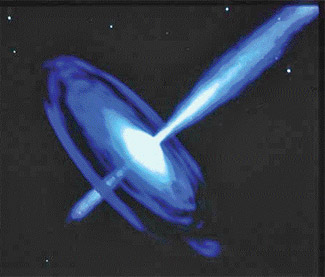|
Black holes spin faster and faster
Two UK astronomers have found that the giant black holes in the
centre of galaxies are on average spinning faster than at any time in
the history of the Universe. Dr Alejo Martinez-Sansigre of the
University of Portsmouth and Prof. Steve Rawlings of the University of
Oxford made the new discovery by using radio, optical and X-ray data.
|

The spin of black holes reveal how they formed. |
There is strong evidence that every galaxy has a black hole in its
centre. These black holes have masses of between a million and a billion
Suns and so are referred to as 'supermassive'. They cannot be seen
directly, but material swirls around the black hole in a so-called
accretion disk before its final demise. That material can become very
hot and emit radiation including X-rays that can be detected by
space-based telescopes whilst associated radio emission can be detected
by telescopes on the ground.As well as radiation, twin jets are often
associated with black holes and their accretion disks.
There are many factors that can cause these jets to be produced, but
the spin of the supermassive black hole is believed to be important.
However, there are conflicting predictions about how the spins of the
black holes should be evolving and until now this evolution was not well
understood.
Dr Martinez-Sansigre and Professor Rawlings compared theoretical
models of spinning black holes with radio, optical and X-ray
observations made using a variety of instruments and found that the
theories can explain very well the population of supermassive black
holes with jets.Using the radio observations, the two astronomers were
able to sample the population of black holes, deducing the spread of the
power of the jets. By estimating how they acquire material (the
accretion process) the two scientists could then infer how quickly these
objects are spinning.The observations also give information on how the
spins of supermassive black holes have evolved.
In the past, when the Universe was half its the present size,
practically all of the supermassive black holes had very low spins,
whereas nowadays a fraction of them have very high spins. So on average,
supermassive black holes are spinning faster than ever before.
This is the first time that the evolution of the spin of the
supermassive black holes has been constrained and it suggests that those
supermassive black holes that grow by swallowing matter will barely
spin, while those that merge with other black holes will be left
spinning rapidly.
Commenting on the new results, Dr Martinez-Sansigre said: "The spin
of black holes can tell you a lot about how they formed. Our results
suggest that in recent times a large fraction of the most massive black
holes have somehow spun up.
A likely explanation is that they have merged with other black holes
of similar mass, which is a truly spectacular event, and the end product
of this merger is a faster spinning black hole."Professor Rawlings adds:
"Later this decade we hope to test our idea that these supermassive
black holes have been set spinning relatively recently.
Courtesy :Science Daily |

